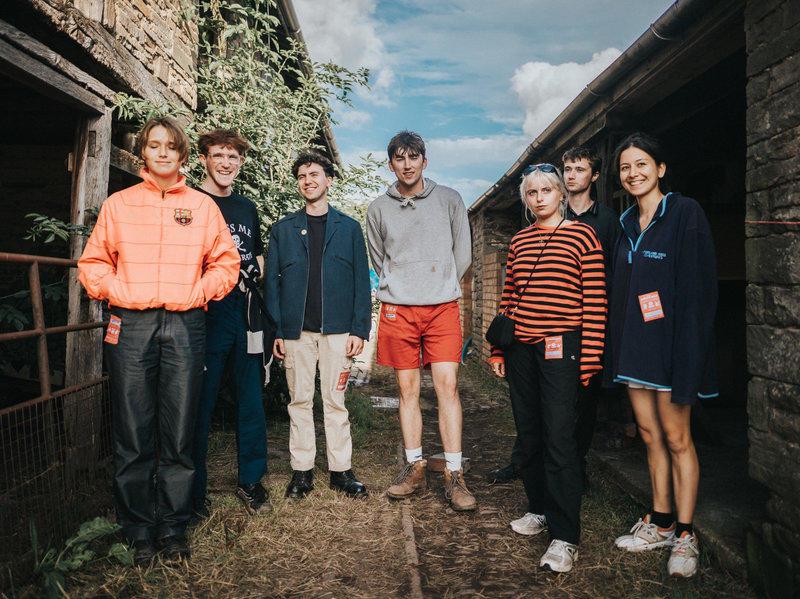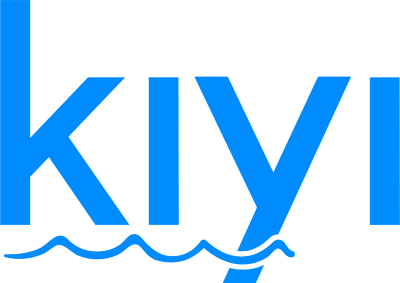“(Our next record) will be totally different from the one before. Watch out for the pirates and the medieval vibes… It’s all gonna change drastically.”
Black Country, New Road’s debut album For The First Time is a unique record that sounds claustrophobic and carnivalesque at the same time. We recently reviewed the album, and like many other platforms, loved it. The eclectic seven-piece band takes their inspiration from various genres involving post-punk, jazz and klezmer music, yet they are entirely something of their own.
We contacted the band and made an interview with the bassist Tyler Hyde and the drummer Charlie Wayne. Hope you’ll enjoy reading!
Click here for the Turkish version of the interview.

How are you guys? How is the lockdown life out there in London?
Tyler: We’re doing better than a lot of people are doing, so no matter how hard we think it is, we are very lucky to be where we are.
Charlie: That’s definitely true. Also, I think the UK government announced a kind of a road map out of the pandemic. Whether it happens or not, there is a date the government set for late June, when they should hopefully be able to lift all the social distancing and stuff, which is very exciting. Not all of us are optimistic about it, but it is nice to have something to think about and look forward to. Also, spring kind of started in London and it feels really nice, it feels good not to be in winter anymore.
Congratulations for your debut record, For the first time. The record is huge right now among the music circles. The last two years have been a wild ride for you, you have been signed to Ninja Tune records, the album has been receiving almost universal praise, you are experiencing instant success. Did you expect to receive acclaim this fast, and how are you dealing with it?
T: We thought it was good, and we think we are a good band, but I don’t think that we expected such a success. We make music for each other as best friends and people that love each other and for music to come from that. Beginning to be liked by people across the world is mind-blowing and it doesn’t really make sense. I’m not bothering to try to process it right now, it would just take too long. Trying to keep a distance and just think about the band and my friends. That’s what we are here for.
C: Definitely. It’s a very relative experience. It’s not like what I imagined an overnight success could look like in regular non-pandemic times, because as it stands, we can’t play any shows. That’s always been a real marker for how we gauge our own experiences of how good or bad the things are going, how the audience, whether big or small, reacts to our shows. I think having the album released and not being able to even properly celebrate it is a very weird thing, because we’re not even working for a long time. Especially weird since it’s also been received quite well. It’s weird, but it’s great.
I want to dwell a bit more on the term “success”. Your album is out for nearly three weeks now, and by the looks of it, its streaming rate is accelerating fast. In this day and age, success is industrially defined by these very streaming rates, but how do you yourself define it? If your figures didn’t go up this fast, would you still say you have achieved success with certain eyes still on you? You know, even us, a music platform from Turkey has reached out to you instantly… (all laugh)
T: I don’t know about these rates. I personally base success on happiness. Performing live makes me happy and we’re not doing that now, but writing with my friends makes me happy. So I think all this streaming talk doesn’t even come into the same question. You know, it’s about a different thing which is being together, writing together, performing together. That’s the successful part.
C: Yeah, I’ve nothing to add to that.
The first I noticed about your music is your natural chemistry, which is something possibly harder to achieve when you are a seven-piece. But of course, you being good friends and sharing a common history in music-making should make things a lot easier. But when you first reformed as BC,NR, did you have a specific mindset on the sound you wanted to make, or did it naturally come out while jamming to see what comes out?
C: There was no pre-established design for what BC,NR was going to be. I think we were lucky that we jell so well as a seven-piece just because we’ve been playing and performing together broadly as seven members for a really long time, and that’s a kind of a way to find your sound rather than thinking about it and trying to pre-establish it. We’ve been playing together for nearly 5 or 6 years now, some of us. That’s where our sound comes from, that’s how we have processed it and how it’s reached to the point where it is. It’s constantly changing. Maybe now it is based more on the discussions. A while ago, we were actually able to play gigs which has always been a really important thing for us to shape your sound. I’d say for BC,NR, it has always been super important to just roll, and that’s why we’re together for such a long time.
T: It was all no-concept when we had begun. They were just songs written for the sake of performing live. And now, the second album we’re working on is totally a concept album and, probably, it’ll be a different concept for BC,NR every year. It will be totally different from the one before. Watch out for the pirates and the medieval vibes… It’s all gonna change drastically.
Really looking forward to your next album.
(both laugh)
You rose to early prominence through your gigs in The Windmill, which has an ongoing tradition of introducing new great bands early on. Can you tell our readers what makes that pub so important to the music scene and to you?
C: I think inclusivity is the really important thing. Tim, the guy who curates the lineup (curating being a very loose term here), has got a fantastic ethos in running that place. He puts on bands, he takes little risks every time. It really pays off, it really plays into the fantastic creativity, creative freedom and openness that the venue has. It’s so important for fostering a really nice and friendly scene, because without a venue like that where you can put on anything and have people come to it knowing that they’ll see something interesting… It’s totally invaluable and it has helped us and many other folks. That’s an amazing thing.
Your sound is vastly eclectic. You are often compared to Slint and you share a common history with Black Midi. You are also influenced by klezmer music, which interests me partly because it is geographically quite relevant for someone living in Istanbul. What is your background regarding this genre and how did you go about incorporating elements of it into your music?
T: That’s specific to Lewis (Evans) and Georgia (Ellery). Lewis is the saxophonist and Georgia is the violinist. They had a very musical background. They know how to improvise based on classical music and when we first started BC,NR, we spent a weekend writing together. We were essentially throwing out some ideas and improvising between those ideas. Without discussing with us, Lewis and Georgia just began this, because it was what they’d been taught and that was their natural way of improvising. That’s how that came about. It wasn’t really considered. But it nicely fits with the arrangement of the album which opens with “Instrumental” and ends with “Opus”, both of which are closely related to the sound.
You re-recorded your early singles Sunglasses and Athens, France for the record. How did you approach, let’s say, updating your previous songs?
C: Yeah, updating, I think that’s the way we approached them. It would have felt really incongruous to put old versions of the tracks onto an album that was meant to be a document of where the band was at that period of time in march of 2020. Everything that led up to that point had been subject to change, different elements being put and taken out. It felt obvious that we should do that with Athens, France and Sunglasses. In part because they had been in the public domain and there were parts that we wanted to change, but most importantly because we wanted to make the album feel like a whole, so we recorded it as one body of work, which it is. It would have felt stupid to not record it all as one whole.
T: Lazy as well. It would be unfair for the people buying the album. They already knew the songs, so if we had literally just whacked on the old version, put it and called it an album, that would be so unfair to charge them 20-30 quid for it. (laughs)
This question maybe concerns Isaac more than you, but I’d like to hear your opinion as well: Your lyrics are loaded with humorous, intellectual storytelling. What I wonder is who are some of your favourite storytellers?
T: Leonard Cohen, maybe Isaac would agree with that as well. Johnny Cash, Dylan… All the classic country or folk singers. I love the way Townes Van Zandt tells stories.
C: Definitely. I like the way Nick Cave tells stories. I think he’s fantastic. Adrianne Lenker, I think her songwriting is really, really beautiful. It’s really vocative. I think we all broadly share and enjoy all these lyricists. You can ask any member of the band and they would all say it like that.
Did you receive any calls or messages from Kanye West?
C: (laughs) We’re still waiting, I check my phone every five to ten minutes, you know, just hoping he’s gonna get in touch. He’s probably too busy with writing the best break-up album of all time at the moment. We hope to be a part of it, but we’re not holding our breath.
What is your favourite Scott Walker album?
C: Tyler and I talked about this before. I don’t know what you think of some of his later stuff, but the last time we spoke, we actually both preferred his earlier stuff.
T: The later is more theatrical stuff, and I don’t really like musical theatres, but it’s verging on it at points. (laughs) I used to be a huge fan of his. There’s one from every one of his first four albums that I really love, but as a whole album, I guess Scott 2 is what I love the most? I don’t know, or Scott 3? I can’t properly answer that question, because they are all different moods, aren’t they? They are all phases. You can not commit to only one of those phases.
C: My favourite is the first one, even though half of it is covers of Jacques Brel.
T: No! That one’s just mediocre!
C: No, it’s not! It’s an amazing album!
T: There are some good songs on it, but I refuse to believe the first one’s the best.
C: And if it was to be one of his experimental albums, I’d say Bish Bosch.
T: Yeah.
C: Scott is his best album though. (laughs)
T: No! Anything from the earlier period but that. (laughs)
You and I have something in common: We both face this hellish pandemic in the prime of our youth. How do you, as a band, cope with the current events?
C: (laughs) We’re trying to think about it as little as possible. I think we’ve been incredibly lucky, because we are all very close friends and we’ve been able to work with each other, because the English government has allowed bands to operate as a sort of work bubble for some parts of the pandemic.
T: But that wasn’t personally directed to us. (both laugh)
C: Well yeah, all they said was that we can work together, but…
By the way, if you want to touch upon Brexit’s effects on musicians, please don’t hesitate.
C: That’s a completely different topic. We feel very. very strongly about it and sort of depressed by it.
T: But more for other people than ourselves.
C: Yeah, in that sense, the pandemic and also Brexit have been devastating for upcoming bands. We did rely so heavily on the kindness of small venues basically putting us on and taking the chance on us and other bands. These venues look more and more like they won’t be able to operate after the pandemic, because they can’t afford to. They had to close down because of the lack of the government’s support. I think it’s gonna be difficult for the scene to return in the same way that we definitely advantaged from and relied on coming up as a band. And I think for Brexit, it’s relatively a similar story. Financially, you’re not gonna make any money as a small and not-wealthy band but we never had to worry about paying for visas going to perform in Europe. We don’t know how much the visa will cost to go to perform in mainland Europe but let’s say it’s 100 euros for a blanket visa across the continent. For the seven members of the band and the tour manager’s, that’s 800 euros before we even play the show. I remember playing our first ever set of shows in Europe and we got something like 50 euros a night for the whole band. We lost money on that tour, but we did it because we could just about pull that money together out of the weekend jobs that we had. It’s inconceivable that we have to pay that amount of money. We just wouldn’t be able to do the tours as a support band, or those supports would become completely invaluable for young bands. It’s very depressing. It’s a black mark on the British government and shows their inability to see the art as a valuable part of life.
Let’s hope that you’ll manage to go through that with the least damage possible.
C: I think it’s important to stress that we’re not the ones to feel sorry for. We managed to sign a record deal before the pandemic and Brexit. I mean we’ve been able to go through the small steps, which is super important and super crucial. It’s the next set of bands coming through that I feel bad for.
Where do you plan to go from here? You previously mused about becoming the next Arcade Fire, what is your current goal?
T: To support The Killers on their next stadium tour.
C: Yeah, that would be great. Fingers crossed. To support the Killers and to write a better second album than we did.
T: And then later write a better third album.
C: Right. Always improving.
T: Only going up from here.
I believe you’ll go up. Thanks a lot for this interview. Maybe someday you’ll perform here too.
C: We’d love to come to Istanbul. Thank you so much for taking your time. Cheers.
You can check out Black Country, New Road’s official website here and Bandcamp profile here.



